
List of Nobel laureates in Economics
Encyclopedia
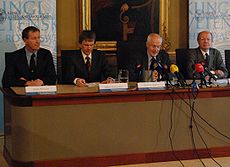
Nobel Memorial Prize in Economic Sciences
The Nobel Memorial Prize in Economic Sciences, commonly referred to as the Nobel Prize in Economics, but officially the Sveriges Riksbank Prize in Economic Sciences in Memory of Alfred Nobel , is an award for outstanding contributions to the field of economics, generally regarded as one of the...
, officially known as The Sveriges Riksbank Prize in Economic Sciences in Memory of Alfred Nobel (Swedish
Swedish language
Swedish is a North Germanic language, spoken by approximately 10 million people, predominantly in Sweden and parts of Finland, especially along its coast and on the Åland islands. It is largely mutually intelligible with Norwegian and Danish...
: Sveriges riksbanks pris i ekonomisk vetenskap till Alfred Nobels minne), is awarded annually by the Royal Swedish Academy of Sciences
Royal Swedish Academy of Sciences
The Royal Swedish Academy of Sciences or Kungliga Vetenskapsakademien is one of the Royal Academies of Sweden. The Academy is an independent, non-governmental scientific organization which acts to promote the sciences, primarily the natural sciences and mathematics.The Academy was founded on 2...
to researchers in the field of economics
Economics
Economics is the social science that analyzes the production, distribution, and consumption of goods and services. The term economics comes from the Ancient Greek from + , hence "rules of the house"...
. It is not one of the original five Nobel Prize
Nobel Prize
The Nobel Prizes are annual international awards bestowed by Scandinavian committees in recognition of cultural and scientific advances. The will of the Swedish chemist Alfred Nobel, the inventor of dynamite, established the prizes in 1895...
s established by the 1895 will
Will (law)
A will or testament is a legal declaration by which a person, the testator, names one or more persons to manage his/her estate and provides for the transfer of his/her property at death...
of Alfred Nobel
Alfred Nobel
Alfred Bernhard Nobel was a Swedish chemist, engineer, innovator, and armaments manufacturer. He is the inventor of dynamite. Nobel also owned Bofors, which he had redirected from its previous role as primarily an iron and steel producer to a major manufacturer of cannon and other armaments...
for outstanding contributions in the fields of chemistry
Nobel Prize in Chemistry
The Nobel Prize in Chemistry is awarded annually by the Royal Swedish Academy of Sciences to scientists in the various fields of chemistry. It is one of the five Nobel Prizes established by the will of Alfred Nobel in 1895, awarded for outstanding contributions in chemistry, physics, literature,...
, physics
Nobel Prize in Physics
The Nobel Prize in Physics is awarded once a year by the Royal Swedish Academy of Sciences. It is one of the five Nobel Prizes established by the will of Alfred Nobel in 1895 and awarded since 1901; the others are the Nobel Prize in Chemistry, Nobel Prize in Literature, Nobel Peace Prize, and...
, literature
Nobel Prize in Literature
Since 1901, the Nobel Prize in Literature has been awarded annually to an author from any country who has, in the words from the will of Alfred Nobel, produced "in the field of literature the most outstanding work in an ideal direction"...
, peace
Nobel Peace Prize
The Nobel Peace Prize is one of the five Nobel Prizes bequeathed by the Swedish industrialist and inventor Alfred Nobel.-Background:According to Nobel's will, the Peace Prize shall be awarded to the person who...
, and physiology or medicine
Nobel Prize in Physiology or Medicine
The Nobel Prize in Physiology or Medicine administered by the Nobel Foundation, is awarded once a year for outstanding discoveries in the field of life science and medicine. It is one of five Nobel Prizes established in 1895 by Swedish chemist Alfred Nobel, the inventor of dynamite, in his will...
, and is not technically a Nobel Prize. The award was established and funded in 1968 by the Sveriges Riksbank
Sveriges Riksbank
Sveriges Riksbank, or simply Riksbanken, is the central bank of Sweden and the world's oldest central bank. It is sometimes called the Swedish National Bank or the Bank of Sweden .-History:...
, the central bank
Central bank
A central bank, reserve bank, or monetary authority is a public institution that usually issues the currency, regulates the money supply, and controls the interest rates in a country. Central banks often also oversee the commercial banking system of their respective countries...
of Sweden
Sweden
Sweden , officially the Kingdom of Sweden , is a Nordic country on the Scandinavian Peninsula in Northern Europe. Sweden borders with Norway and Finland and is connected to Denmark by a bridge-tunnel across the Öresund....
, on the 300th anniversary of the bank, and has been awarded annually since. The first award was given in 1969 to Ragnar Frisch
Ragnar Anton Kittil Frisch
Ragnar Anton Kittil Frisch was a Norwegian economist and the co-winner with Jan Tinbergen of the first Nobel Memorial Prize in Economic Sciences in 1969...
and Jan Tinbergen
Jan Tinbergen
Jan Tinbergen , was a Dutch economist. He was awarded the first Bank of Sweden Prize in Economic Sciences in Memory of Alfred Nobel in 1969, which he shared with Ragnar Frisch for having developed and applied dynamic models for the analysis of economic processes...
. Each recipient receives a medal, a diploma and a monetary award that has varied throughout the years. In 1969, Frisch and Tinbergen were given a combined 375,000 SEK
Swedish krona
The krona has been the currency of Sweden since 1873. Both the ISO code "SEK" and currency sign "kr" are in common use; the former precedes or follows the value, the latter usually follows it, but especially in the past, it sometimes preceded the value...
, which is equivalent to 2,871,041 SEK in December 2007. In 2008, the prize was awarded to Paul Krugman
Paul Krugman
Paul Robin Krugman is an American economist, professor of Economics and International Affairs at the Woodrow Wilson School of Public and International Affairs at Princeton University, Centenary Professor at the London School of Economics, and an op-ed columnist for The New York Times...
, who received the prize amount of 10,000,000 SEK ($1.2 million). The award is presented in Stockholm
Stockholm
Stockholm is the capital and the largest city of Sweden and constitutes the most populated urban area in Scandinavia. Stockholm is the most populous city in Sweden, with a population of 851,155 in the municipality , 1.37 million in the urban area , and around 2.1 million in the metropolitan area...
at an annual ceremony on December 10, the anniversary
Anniversary
An anniversary is a day that commemorates or celebrates a past event that occurred on the same day of the year as the initial event. For example, the first event is the initial occurrence or, if planned, the inaugural of the event. One year later would be the first anniversary of that event...
of Nobel's death.
As of 2011, 43 Nobel Memorial Prizes in Economic Sciences have been given to 69 individuals. Seven awards have been given for contributions to the field of macroeconomics
Macroeconomics
Macroeconomics is a branch of economics dealing with the performance, structure, behavior, and decision-making of the whole economy. This includes a national, regional, or global economy...
, more than any other category. The institution with the most affiliated Nobel laureates in Economics is the University of Chicago
University of Chicago
The University of Chicago is a private research university in Chicago, Illinois, USA. It was founded by the American Baptist Education Society with a donation from oil magnate and philanthropist John D. Rockefeller and incorporated in 1890...
, which has 26 affiliated laureates.
Laureates
| Year | Laureate | Country | Rationale | |
|---|---|---|---|---|
| 1969 | Ragnar Anton Kittil Frisch | Norway Norway Norway , officially the Kingdom of Norway, is a Nordic unitary constitutional monarchy whose territory comprises the western portion of the Scandinavian Peninsula, Jan Mayen, and the Arctic archipelago of Svalbard and Bouvet Island. Norway has a total area of and a population of about 4.9 million... |
"for having developed and applied dynamic models for the analysis of economic processes" | |
 |
Jan Tinbergen Jan Tinbergen Jan Tinbergen , was a Dutch economist. He was awarded the first Bank of Sweden Prize in Economic Sciences in Memory of Alfred Nobel in 1969, which he shared with Ragnar Frisch for having developed and applied dynamic models for the analysis of economic processes... |
Netherlands Netherlands The Netherlands is a constituent country of the Kingdom of the Netherlands, located mainly in North-West Europe and with several islands in the Caribbean. Mainland Netherlands borders the North Sea to the north and west, Belgium to the south, and Germany to the east, and shares maritime borders... |
||
| 1970 | 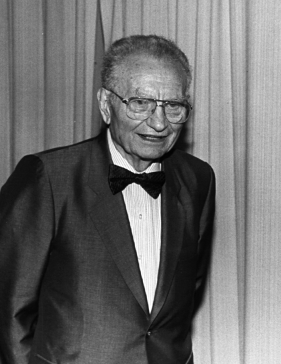 |
Paul Samuelson Paul Samuelson Paul Anthony Samuelson was an American economist, and the first American to win the Nobel Memorial Prize in Economic Sciences. The Swedish Royal Academies stated, when awarding the prize, that he "has done more than any other contemporary economist to raise the level of scientific analysis in... |
United States United States The United States of America is a federal constitutional republic comprising fifty states and a federal district... |
"for the scientific work through which he has developed static and dynamic economic theory and actively contributed to raising the level of analysis in economic science" |
| 1971 | Simon Kuznets Simon Kuznets Simon Smith Kuznets was a Russian American economist at the Wharton School of the University of Pennsylvania who won the 1971 Nobel Memorial Prize in Economic Sciences "for his empirically founded interpretation of economic growth which has led to new and deepened insight into the economic and... |
United States | "for his empirically founded interpretation of economic growth which has led to new and deepened insight into the economic and social structure and process of development" | |
| 1972 | John Hicks John Hicks Sir John Richard Hicks was a British economist and one of the most important and influential economists of the twentieth century. The most familiar of his many contributions in the field of economics were his statement of consumer demand theory in microeconomics, and the IS/LM model , which... |
United Kingdom United Kingdom The United Kingdom of Great Britain and Northern IrelandIn the United Kingdom and Dependencies, other languages have been officially recognised as legitimate autochthonous languages under the European Charter for Regional or Minority Languages... |
"for their pioneering contributions to general economic equilibrium theory General equilibrium General equilibrium theory is a branch of theoretical economics. It seeks to explain the behavior of supply, demand and prices in a whole economy with several or many interacting markets, by seeking to prove that a set of prices exists that will result in an overall equilibrium, hence general... and welfare theory." |
|
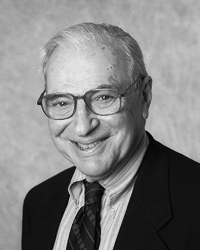 |
Kenneth Arrow Kenneth Arrow Kenneth Joseph Arrow is an American economist and joint winner of the Nobel Memorial Prize in Economics with John Hicks in 1972. To date, he is the youngest person to have received this award, at 51.... |
United States | ||
| 1973 | Wassily Leontief Wassily Leontief Wassily Wassilyovich Leontief , was a Russian-American economist notable for his research on how changes in one economic sector may have an effect on other sectors. Leontief won the Nobel Committee's Nobel Memorial Prize in Economic Sciences in 1973, and three of his doctoral students have also... |
United States | "for the development of the input-output method and for its application to important economic problems" | |
| 1974 | 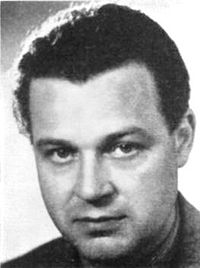 |
Gunnar Myrdal Gunnar Myrdal Karl Gunnar Myrdal was a Swedish Nobel Laureate economist, sociologist, and politician. In 1974, he received the Nobel Memorial Prize in Economic Sciences with Friedrich Hayek for "their pioneering work in the theory of money and economic fluctuations and for their penetrating analysis of the... |
Sweden Sweden Sweden , officially the Kingdom of Sweden , is a Nordic country on the Scandinavian Peninsula in Northern Europe. Sweden borders with Norway and Finland and is connected to Denmark by a bridge-tunnel across the Öresund.... |
"for their pioneering work in the theory of money Monetary policy Monetary policy is the process by which the monetary authority of a country controls the supply of money, often targeting a rate of interest for the purpose of promoting economic growth and stability. The official goals usually include relatively stable prices and low unemployment... and economic fluctuations and for their penetrating analysis of the interdependence of economic, social and institutional phenomena." |
| Friedrich Hayek Friedrich Hayek Friedrich August Hayek CH , born in Austria-Hungary as Friedrich August von Hayek, was an economist and philosopher best known for his defense of classical liberalism and free-market capitalism against socialist and collectivist thought... |
United Kingdom/Austria Austria Austria , officially the Republic of Austria , is a landlocked country of roughly 8.4 million people in Central Europe. It is bordered by the Czech Republic and Germany to the north, Slovakia and Hungary to the east, Slovenia and Italy to the south, and Switzerland and Liechtenstein to the... |
|||
| 1975 | Leonid Kantorovich Leonid Kantorovich Leonid Vitaliyevich Kantorovich was a Soviet mathematician and economist, known for his theory and development of techniques for the optimal allocation of resources... |
Soviet Union Soviet Union The Soviet Union , officially the Union of Soviet Socialist Republics , was a constitutionally socialist state that existed in Eurasia between 1922 and 1991.... |
"for their contributions to the theory of optimum allocation Pareto efficiency Pareto efficiency, or Pareto optimality, is a concept in economics with applications in engineering and social sciences. The term is named after Vilfredo Pareto, an Italian economist who used the concept in his studies of economic efficiency and income distribution.Given an initial allocation of... of resources" |
|
| Tjalling Koopmans Tjalling Koopmans Tjalling Charles Koopmans was the joint winner, with Leonid Kantorovich, of the 1975 Nobel Memorial Prize in Economic Sciences.... |
United States | |||
| 1976 | Milton Friedman Milton Friedman Milton Friedman was an American economist, statistician, academic, and author who taught at the University of Chicago for more than three decades... |
United States | "for his achievements in the fields of consumption Consumption (economics) Consumption is a common concept in economics, and gives rise to derived concepts such as consumer debt. Generally, consumption is defined in part by comparison to production. But the precise definition can vary because different schools of economists define production quite differently... analysis, monetary history and theory and for his demonstration of the complexity of stabilisation policy" |
|
| 1977 | 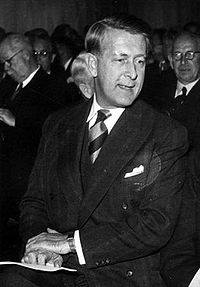 |
Bertil Ohlin Bertil Ohlin Bertil Gotthard Ohlin was a Swedish economist and politician. He was a professor of economics at the Stockholm School of Economics from 1929 to 1965. He was also leader of the People's Party, a social-liberal party which at the time was the largest party in opposition to the governing Social... |
Sweden | "for their pathbreaking contribution to the theory of international trade International trade International trade is the exchange of capital, goods, and services across international borders or territories. In most countries, such trade represents a significant share of gross domestic product... and international capital Capital (economics) In economics, capital, capital goods, or real capital refers to already-produced durable goods used in production of goods or services. The capital goods are not significantly consumed, though they may depreciate in the production process... movements" |
| James Meade James Meade James Edward Meade CB, FBA was a British economist and winner of the 1977 Nobel Memorial Prize in Economic Sciences jointly with the Swedish economist Bertil Ohlin for their "Pathbreaking contribution to the theory of international trade and international capital movements."Meade was born in... |
United Kingdom United Kingdom The United Kingdom of Great Britain and Northern IrelandIn the United Kingdom and Dependencies, other languages have been officially recognised as legitimate autochthonous languages under the European Charter for Regional or Minority Languages... |
|||
| 1978 |  |
Herbert Simon Herbert Simon Herbert Alexander Simon was an American political scientist, economist, sociologist, and psychologist, and professor—most notably at Carnegie Mellon University—whose research ranged across the fields of cognitive psychology, cognitive science, computer science, public administration, economics,... |
United States | "for his pioneering research into the decision-making process within economic organizations" |
| 1979 | Theodore Schultz Theodore Schultz Theodore William Schultz was the 1979 winner of the Nobel Memorial Prize in Economic Sciences.... |
United States | "for their pioneering research into economic development research with particular consideration of the problems of developing countries." | |
| Arthur Lewis | Saint Lucia Saint Lucia Saint Lucia is an island country in the eastern Caribbean Sea on the boundary with the Atlantic Ocean. Part of the Lesser Antilles, it is located north/northeast of the island of Saint Vincent, northwest of Barbados and south of Martinique. It covers a land area of 620 km2 and has an... |
|||
| 1980 | Lawrence Klein Lawrence Klein Lawrence Robert Klein is an American economist. For his work in creating computer models to forecast economic trends in the field of econometrics at the Wharton School of the University of Pennsylvania, he was awarded the Nobel Memorial Prize in Economic Sciences in 1980... |
United States | "for the creation of econometric models and the application to the analysis of economic fluctuations and economic policies" | |
| 1981 | James Tobin James Tobin James Tobin was an American economist who, in his lifetime, served on the Council of Economic Advisors and the Board of Governors of the Federal Reserve System, and taught at Harvard and Yale Universities. He developed the ideas of Keynesian economics, and advocated government intervention to... |
United States | "for his analysis of financial market Financial market In economics, a financial market is a mechanism that allows people and entities to buy and sell financial securities , commodities , and other fungible items of value at low transaction costs and at prices that reflect supply and demand.Both general markets and... s and their relations to expenditure decisions, employment, production and prices" |
|
| 1982 | George Stigler George Stigler George Joseph Stigler was a U.S. economist. He won the Nobel Memorial Prize in Economic Sciences in 1982, and was a key leader of the Chicago School of Economics, along with his close friend Milton Friedman.... |
United States | "for his seminal studies of industrial structures, functioning of markets and causes and effects of public regulation Regulation Regulation is administrative legislation that constitutes or constrains rights and allocates responsibilities. It can be distinguished from primary legislation on the one hand and judge-made law on the other... " |
|
| 1983 | .jpg) |
Gérard Debreu Gerard Debreu Gérard Debreu was a French economist and mathematician, who also came to have United States citizenship. Best known as a professor of economics at the University of California, Berkeley, where he began work in 1962, he won the 1983 Nobel Memorial Prize in Economics.-Biography:His father was the... |
France France The French Republic , The French Republic , The French Republic , (commonly known as France , is a unitary semi-presidential republic in Western Europe with several overseas territories and islands located on other continents and in the Indian, Pacific, and Atlantic oceans. Metropolitan France... |
"for having incorporated new analytical methods into economic theory and for his rigorous reformulation of the theory of general equilibrium General equilibrium General equilibrium theory is a branch of theoretical economics. It seeks to explain the behavior of supply, demand and prices in a whole economy with several or many interacting markets, by seeking to prove that a set of prices exists that will result in an overall equilibrium, hence general... " |
| 1984 | Richard Stone Richard Stone Sir John Richard Nicholas Stone was an eminent British economist who in 1984 received the Nobel Memorial Prize in Economic Sciences for developing an accounting model that could be used to track economic activities on a national and, later, an international scale... |
United Kingdom | "for having made fundamental contributions to the development of systems of national accounts and hence greatly improved the basis for empirical economic analysis" | |
| 1985 |  |
Franco Modigliani Franco Modigliani Franco Modigliani was an Italian economist at the MIT Sloan School of Management and MIT Department of Economics, and winner of the Nobel Memorial Prize in Economics in 1985.-Life and career:... |
Italy Italy Italy , officially the Italian Republic languages]] under the European Charter for Regional or Minority Languages. In each of these, Italy's official name is as follows:;;;;;;;;), is a unitary parliamentary republic in South-Central Europe. To the north it borders France, Switzerland, Austria and... |
"for his pioneering analyses of saving and of financial market Financial market In economics, a financial market is a mechanism that allows people and entities to buy and sell financial securities , commodities , and other fungible items of value at low transaction costs and at prices that reflect supply and demand.Both general markets and... s" |
| 1986 | James M. Buchanan James M. Buchanan James McGill Buchanan, Jr. is an American economist known for his work on public choice theory, for which he received the 1986 Nobel Memorial Prize in Economic Sciences. Buchanan's work initiated research on how politicians' self-interest and non-economic forces affect government economic policy... |
United States | "for his development of the contract Contract A contract is an agreement entered into by two parties or more with the intention of creating a legal obligation, which may have elements in writing. Contracts can be made orally. The remedy for breach of contract can be "damages" or compensation of money. In equity, the remedy can be specific... ual and constitution Constitution A constitution is a set of fundamental principles or established precedents according to which a state or other organization is governed. These rules together make up, i.e. constitute, what the entity is... al bases for the theory of economic and political decision-making" |
|
| 1987 | Robert Solow Robert Solow Robert Merton Solow is an American economist particularly known for his work on the theory of economic growth that culminated in the exogenous growth model named after him... |
United States | "for his contributions to the theory of economic growth Economic growth In economics, economic growth is defined as the increasing capacity of the economy to satisfy the wants of goods and services of the members of society. Economic growth is enabled by increases in productivity, which lowers the inputs for a given amount of output. Lowered costs increase demand... " |
|
| 1988 | Maurice Allais Maurice Allais Maurice Félix Charles Allais was a French economist, and was the 1988 winner of the Nobel Memorial Prize in Economics "for his pioneering contributions to the theory of markets and efficient utilization of resources."... |
France | "for his pioneering contributions to the theory of markets and efficient utilization of resources Capacity utilization Capacity utilization is a concept in economics and managerial accounting which refers to the extent to which an enterprise or a nation actually uses its installed productive capacity... " |
|
| 1989 | Trygve Haavelmo Trygve Haavelmo Trygve Magnus Haavelmo , born in Skedsmo, Norway, was an influential economist with main research interests centered on the fields of econometrics and economics theory. During World War II he worked with Nortraship in the Statistical Department in New York City. He received his Ph.D... |
Norway | "for his clarification of the probability theory foundations of econometrics and his analyses of simultaneous economic structures" | |
| 1990 | Harry Markowitz Harry Markowitz Harry Max Markowitz is an American economist and a recipient of the John von Neumann Theory Prize and the Nobel Memorial Prize in Economic Sciences.... |
United States | "for their pioneering work in the theory of financial economics Financial economics Financial Economics is the branch of economics concerned with "the allocation and deployment of economic resources, both spatially and across time, in an uncertain environment".... " |
|
| Merton Miller Merton Miller Merton Howard Miller was the co-author of the Modigliani-Miller theorem which proposed the irrelevance of debt-equity structure. He shared the Nobel Memorial Prize in Economic Sciences in 1990, along with Harry Markowitz and William Sharpe... |
United States | |||
 |
William Forsyth Sharpe William Forsyth Sharpe William Forsyth Sharpe is the STANCO 25 Professor of Finance, Emeritus at Stanford University's Graduate School of Business and the winner of the 1990 Nobel Memorial Prize in Economic Sciences.... |
United States | ||
| 1991 | Ronald Coase Ronald Coase Ronald Harry Coase is a British-born, American-based economist and the Clifton R. Musser Professor Emeritus of Economics at the University of Chicago Law School. After studying with the University of London External Programme in 1927–29, Coase entered the London School of Economics, where he took... |
United Kingdom | "for his discovery and clarification of the significance of transaction cost Transaction cost In economics and related disciplines, a transaction cost is a cost incurred in making an economic exchange . For example, most people, when buying or selling a stock, must pay a commission to their broker; that commission is a transaction cost of doing the stock deal... s and property rights for the institutional structure and functioning of the economy" |
|
| 1992 |  |
Gary Becker Gary Becker Gary Stanley Becker is an American economist. He is a professor of economics, sociology at the University of Chicago and a professor at the Booth School of Business. He was awarded the Nobel Memorial Prize in Economic Sciences in 1992, and received the United States' Presidential Medal of Freedom... |
United States | "for having extended the domain of microeconomic analysis to a wide range of human behaviour Human Behaviour "Human Behaviour" is Icelandic singer Björk's first solo single, taken from the album Debut. It contains a sample of "Go Down Dying" by Antonio Carlos Jobim. The lyrics reflect on human nature and emotion from a non-human animal's point of view. The song is the first part of a series of songs that... and interaction, including non-market behaviour" |
| 1993 |  |
Robert Fogel Robert Fogel Robert William Fogel is an American economic historian and scientist, and winner of the 1993 Nobel Memorial Prize in Economic Sciences. He is now the Charles R. Walgreen Distinguished Service Professor of American Institutions and director of the Center for Population Economics at the... |
United States | "for having renewed research in economic history Economic history Economic history is the study of economies or economic phenomena in the past. Analysis in economic history is undertaken using a combination of historical methods, statistical methods and by applying economic theory to historical situations and institutions... by applying economic theory and quantitative methods in order to explain economic and institutional change" |
| Douglass North Douglass North Douglass Cecil North is an American economist known for his work in economic history. He is the co-recipient of the 1993 Nobel Memorial Prize in Economic Sciences... |
United States | |||
| 1994 | John Harsanyi John Harsanyi John Charles Harsanyi was a Hungarian-Australian-American economist and Nobel Memorial Prize in Economic Sciences winner.... |
United States | "for their pioneering analysis of equilibria in the theory of non-cooperative games Game theory Game theory is a mathematical method for analyzing calculated circumstances, such as in games, where a person’s success is based upon the choices of others... ." |
|
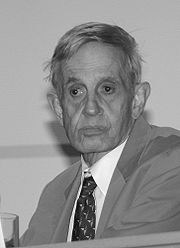 |
John Forbes Nash John Forbes Nash John Forbes Nash, Jr. is an American mathematician whose works in game theory, differential geometry, and partial differential equations have provided insight into the forces that govern chance and events inside complex systems in daily life... |
United States | ||
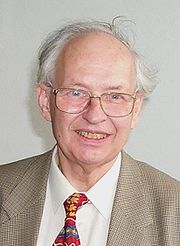 |
Reinhard Selten Reinhard Selten -Life and career:Selten was born in Breslau in Lower Silesia, now in Poland, to a Jewish father, Adolf Selten, and Protestant mother, Käthe Luther. For his work in game theory, Selten won the 1994 Nobel Memorial Prize in Economic Sciences... |
Germany Germany Germany , officially the Federal Republic of Germany , is a federal parliamentary republic in Europe. The country consists of 16 states while the capital and largest city is Berlin. Germany covers an area of 357,021 km2 and has a largely temperate seasonal climate... |
||
| 1995 | Robert Lucas, Jr. Robert Lucas, Jr. Robert Emerson Lucas, Jr. is an American economist at the University of Chicago. He received the Nobel Prize in Economics in 1995 and is consistently indexed among the top 10 economists in the Research Papers in Economics rankings. He is married to economist Nancy Stokey.He received his B.A. in... |
United States | "for having developed and applied the hypothesis of rational expectations Rational expectations Rational expectations is a hypothesis in economics which states that agents' predictions of the future value of economically relevant variables are not systematically wrong in that all errors are random. An alternative formulation is that rational expectations are model-consistent expectations, in... , and thereby having transformed macroeconomic analysis Model (macroeconomics) A macroeconomic model is an analytical tool designed to describe the operation of the economy of a country or a region. These models are usually designed to examine the dynamics of aggregate quantities such as the total amount of goods and services produced, total income earned, the level of... and deepened our understanding of economic policy" |
|
| 1996 | James Mirrlees James Mirrlees Sir James Alexander Mirrlees is a Scottish economist and winner of the 1996 Nobel Memorial Prize in Economic Sciences. He was knighted in 1998.... |
United Kingdom | "for their fundamental contributions to the economic theory of incentives under asymmetric information" | |
| William Vickrey William Vickrey William Spencer Vickrey was a Canadian professor of economics and Nobel Laureate. Vickrey was awarded the Nobel Memorial Prize in Economics with James Mirrlees for their research into the economic theory of incentives under asymmetric information... |
United States Canada Canada Canada is a North American country consisting of ten provinces and three territories. Located in the northern part of the continent, it extends from the Atlantic Ocean in the east to the Pacific Ocean in the west, and northward into the Arctic Ocean... |
|||
| 1997 |  |
Robert C. Merton Robert C. Merton Robert Carhart Merton is an American economist, Nobel laureate in Economics, and professor at the MIT Sloan School of Management.-Biography:... |
United States | "for a new method to determine the value of derivatives Derivative (finance) A derivative instrument is a contract between two parties that specifies conditions—in particular, dates and the resulting values of the underlying variables—under which payments, or payoffs, are to be made between the parties.Under U.S... ." |
 |
Myron Scholes Myron Scholes Myron Samuel Scholes is a Canadian-born American financial economist who is best known as one of the authors of the Black–Scholes equation. In 1997 he was awarded the Nobel Memorial Prize in Economic Sciences for a method to determine the value of derivatives... |
Canada United States |
||
| 1998 | 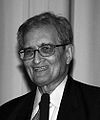 |
Amartya Sen Amartya Sen Amartya Sen, CH is an Indian economist who was awarded the 1998 Nobel Prize in Economic Sciences for his contributions to welfare economics and social choice theory, and for his interest in the problems of society's poorest members... |
India India India , officially the Republic of India , is a country in South Asia. It is the seventh-largest country by geographical area, the second-most populous country with over 1.2 billion people, and the most populous democracy in the world... |
"for his contributions to welfare economics Welfare economics Welfare economics is a branch of economics that uses microeconomic techniques to evaluate economic well-being, especially relative to competitive general equilibrium within an economy as to economic efficiency and the resulting income distribution associated with it... " |
| 1999 | 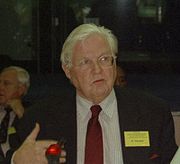 |
Robert Mundell Robert Mundell Robert Mundell, CC is a Nobel Prize-winning Canadian economist. Currently, Mundell is a professor of economics at Columbia University and the Chinese University of Hong Kong.... |
Canada | "for his analysis of monetary Monetary policy Monetary policy is the process by which the monetary authority of a country controls the supply of money, often targeting a rate of interest for the purpose of promoting economic growth and stability. The official goals usually include relatively stable prices and low unemployment... and fiscal policy Fiscal policy In economics and political science, fiscal policy is the use of government expenditure and revenue collection to influence the economy.... under different exchange rate Exchange rate In finance, an exchange rate between two currencies is the rate at which one currency will be exchanged for another. It is also regarded as the value of one country’s currency in terms of another currency... regimes and his analysis of optimum currency areas" |
| 2000 |  |
James Heckman James Heckman James Joseph Heckman is an American economist and Nobel laureate. He is the Henry Schultz Distinguished Service Professor of Economics at the University of Chicago, Professor of Science and Society at University College Dublin and a Senior Research Fellow at the American Bar Foundation.Heckman... |
United States | "for his development of theory and methods for analyzing selective samples" |
 |
Daniel McFadden Daniel McFadden Daniel Little McFadden is an econometrician who shared the 2000 Nobel Memorial Prize in Economic Sciences with James Heckman ; McFadden's share of the prize was "for his development of theory and methods for analyzing discrete choice". He was the E. Morris Cox Professor of Economics at the... |
United States | "for his development of theory and methods for analyzing discrete choice Discrete choice In economics, discrete choice problems involve choices between two or more discrete alternatives, such as entering or not entering the labor market, or choosing between modes of transport. Such choices contrast with standard consumption models in which the quantity of each good consumed is assumed... " |
|
| 2001 |  |
George Akerlof George Akerlof George Arthur Akerlof is an American economist and Koshland Professor of Economics at the University of California, Berkeley. He won the 2001 Nobel Prize in Economics George Arthur Akerlof (born June 17, 1940) is an American economist and Koshland Professor of Economics at the University of... |
United States | "for their analyses of markets with asymmetric information" |
 |
Michael Spence Michael Spence Andrew Michael Spence is an American economist and recipient of the 2001 Nobel Memorial Prize in Economic Sciences, along with George A. Akerlof and Joseph E. Stiglitz, for their work on the dynamics of information flows and market development. He conducted this research while at Harvard University... |
United States | ||
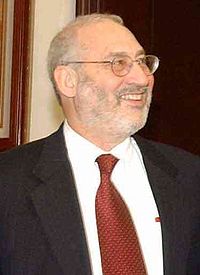 |
Joseph E. Stiglitz Joseph E. Stiglitz Joseph Eugene Stiglitz, ForMemRS, FBA, is an American economist and a professor at Columbia University. He is a recipient of the Nobel Memorial Prize in Economic Sciences and the John Bates Clark Medal . He is also the former Senior Vice President and Chief Economist of the World Bank... |
United States | ||
| 2002 |  |
Daniel Kahneman Daniel Kahneman Daniel Kahneman is an Israeli-American psychologist and Nobel laureate. He is notable for his work on the psychology of judgment and decision-making, behavioral economics and hedonic psychology.... |
Israel Israel The State of Israel is a parliamentary republic located in the Middle East, along the eastern shore of the Mediterranean Sea... United States |
"for having integrated insights from psychological research into economic science, especially concerning human judgment and decision-making under uncertainty" |
 |
Vernon L. Smith Vernon L. Smith Vernon Lomax Smith is professor of economics at Chapman University's Argyros School of Business and Economics and School of Law in Orange, California, a research scholar at George Mason University Interdisciplinary Center for Economic Science, and a Fellow of the Mercatus Center, all in Arlington,... |
United States | "for having established laboratory experiments as a tool in empirical economic analysis, especially in the study of alternative market mechanisms" | |
| 2003 |  |
Robert F. Engle Robert F. Engle Robert Fry Engle III is an American economist and the winner of the 2003 Nobel Memorial Prize in Economic Sciences, sharing the award with Clive Granger, "for methods of analyzing economic time series with time-varying volatility ".-Biography:Engle was born in Syracuse, New York and went on to... |
United States | "for methods of analyzing economic time series Time series In statistics, signal processing, econometrics and mathematical finance, a time series is a sequence of data points, measured typically at successive times spaced at uniform time intervals. Examples of time series are the daily closing value of the Dow Jones index or the annual flow volume of the... with time-varying volatility Volatility (finance) In finance, volatility is a measure for variation of price of a financial instrument over time. Historic volatility is derived from time series of past market prices... (ARCH Autoregressive conditional heteroskedasticity In econometrics, AutoRegressive Conditional Heteroskedasticity models are used to characterize and model observed time series. They are used whenever there is reason to believe that, at any point in a series, the terms will have a characteristic size, or variance... )" |
| Clive Granger Clive Granger Sir Clive William John Granger was a British economist, who taught in Britain at the University of Nottingham and in the U.S.A. at the University of California, San Diego. In 2003, Granger was awarded the Nobel Memorial Prize in Economic Sciences, in recognition that he and his co-winner, Robert F... |
United Kingdom | "for methods of analyzing economic time series with common trends (cointegration Cointegration Cointegration is a statistical property of time series variables. Two or more time series are cointegrated if they share a common stochastic drift.-Introduction:... )" |
||
| 2004 |  |
Finn E. Kydland Finn E. Kydland Finn Erling Kydland is a Norwegian economist. He is currently the Henley Professor of Economics at the University of California, Santa Barbara. He also holds the Richard P... |
Norway | "for their contributions to dynamic macroeconomics: the time consistency of economic policy and the driving forces behind business cycle Business cycle The term business cycle refers to economy-wide fluctuations in production or economic activity over several months or years... s." |
 |
Edward C. Prescott Edward C. Prescott Edward Christian Prescott is an American economist. He received the Nobel Memorial Prize in Economics in 2004, sharing the award with Finn E. Kydland, "for their contributions to dynamic macroeconomics: the time consistency of economic policy and the driving forces behind business cycles"... |
United States | ||
| 2005 |  |
Robert Aumann Robert Aumann Robert John Aumann is an Israeli-American mathematician and a member of the United States National Academy of Sciences. He is a professor at the Center for the Study of Rationality in the Hebrew University of Jerusalem in Israel... |
Israel United States |
"for having enhanced our understanding of conflict and cooperation through game-theory Game theory Game theory is a mathematical method for analyzing calculated circumstances, such as in games, where a person’s success is based upon the choices of others... analysis." |
 |
Thomas Schelling Thomas Schelling Thomas Crombie Schelling is an American economist and professor of foreign affairs, national security, nuclear strategy, and arms control at the School of Public Policy at University of Maryland, College Park. He is also co-faculty at the New England Complex Systems Institute... |
United States | ||
| 2006 |  |
Edmund Phelps Edmund Phelps Edmund Strother Phelps, Jr. is an American economist and the winner of the 2006 Bank of Sweden Prize in Economic Sciences in Memory of Alfred Nobel. Early in his career he became renowned for his research at Yale's Cowles Foundation in the first half of the 1960s on the sources of economic growth... |
United States | "for his analysis of intertemporal tradeoffs in macroeconomic policy" |
| 2007 |  |
Leonid Hurwicz Leonid Hurwicz Leonid "Leo" Hurwicz was a Russian-born American economist and mathematician. His nationality of origin was Polish. He was Jewish. He originated incentive compatibility and mechanism design, which show how desired outcomes are achieved in economics, social science and political science... |
United States | "for having laid the foundations of mechanism design Mechanism design Mechanism design is a field in game theory studying solution concepts for a class of private information games... theory" |
 |
Eric Maskin Eric Maskin Eric Stark Maskin is an American economist and Nobel laureate recognized with Leonid Hurwicz and Roger Myerson "for having laid the foundations of mechanism design theory." He is the Albert O... |
United States | ||
 |
Roger Myerson Roger Myerson Roger Bruce Myerson is an American economist and Nobel laureate recognized with Leonid Hurwicz and Eric Maskin for "having laid the foundations of mechanism design theory." A professor at the University of Chicago, he has made contributions as an economist, as an applied mathematician, and as a... |
United States | ||
| 2008 |  |
Paul Krugman Paul Krugman Paul Robin Krugman is an American economist, professor of Economics and International Affairs at the Woodrow Wilson School of Public and International Affairs at Princeton University, Centenary Professor at the London School of Economics, and an op-ed columnist for The New York Times... |
United States | "for his analysis of trade patterns and location of economic activity" |
| 2009 | Elinor Ostrom Elinor Ostrom Elinor Ostrom is an American political economist. She was awarded the 2009 Nobel Memorial Prize in Economic Sciences, which she shared with Oliver E. Williamson, for "her analysis of economic governance, especially the commons." She was the first, and to date, the only woman to win the prize in... |
United States | "for her analysis of economic governance, especially the commons" | |
| Oliver Williamson | United States | "for his analysis of economic governance, especially the boundaries of the firm" | ||
| 2010 | Peter A. Diamond | United States | "for their analysis of markets with search frictions" | |
| Dale T. Mortensen Dale T. Mortensen Dale Thomas Mortensen is an American economist. He received his B.A. in economics from Willamette University and his Ph.D. in Economics from Carnegie Mellon University. He is a member of the Beta Theta Pi fraternity... |
United States | |||
| Christopher A. Pissarides Christopher A. Pissarides Christopher Antoniou Pissarides F.B.A. is a Cypriot economist. He currently holds the Norman Sosnow Chair in Economics at the London School of Economics. His research interests focus on several topics of macroeconomics, notably labor, economic growth, and economic policy. In 2010, he was awarded... |
Cyprus Cyprus Cyprus , officially the Republic of Cyprus , is a Eurasian island country, member of the European Union, in the Eastern Mediterranean, east of Greece, south of Turkey, west of Syria and north of Egypt. It is the third largest island in the Mediterranean Sea.The earliest known human activity on the... |
|||
| 2011 | Thomas J. Sargent Thomas J. Sargent Thomas John "Tom" Sargent is an American Nobel Memorial Prize in Economic Sciences winning economist, specializing in the fields of macroeconomics, monetary economics and time series econometrics... |
United States | "for their empirical research on cause and effect in the macroeconomy" | |
| Christopher A. Sims Christopher A. Sims Christopher Albert "Chris" Sims is an econometrician and macroeconomist. He is currently the Harold B. Helms Professor of Economics and Banking at Princeton University. Together with Thomas Sargent, he won the Nobel Memorial Prize in Economic Sciences in 2011. The award cited their "empirical... |
United States | |||

